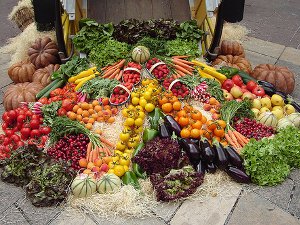 |
Indoor Community GardensTransform one foreclosed or repossessed home per neighborhood into a sustainable, eco-friendly garden that's capable of producing enough healthy fruits and vegetables for 50+ households; hydroponics technology would enable year-round growth. Facilities would be powered by a combination of renewable energy sources (eg, geothermal, thin-film solar, piezoelectric) and designed to leverage passive techniques (eg, rainwater harvesting) to minimize maintenance costs and needs, with neighborhoods providing minimal upkeep. Diets from these gardens could curb childhood obesity and avoid cognitive deficits caused by low-cost foods. (The gardens would also help clean the air.) Image via Creative Commons. by: Steven Edwards | Jul 18, 2010
|
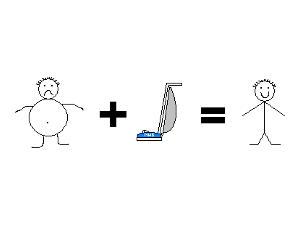 |
Radical Sucks!How about offering Liposuction at a partly subsidised rate on the NHS - whereby the patient pays up front for the procedure (say £500 for example). Then at regular follow ups, if the patient has maintained their weight and adopted a healthier lifestyle (determined by some sort of health checks) then they get their £500 back! Its radical and I reckon it would work in most cases as there is a financial incentive for both sides -the patient wants their cash back, the NHS wants to prevent future admissions (It would have to be a one time only offer though)! by: Les Fawcett | Jul 12, 2010
|
World 5.0I can think of no more valid entry than one that re-orients ourselves and our culture to the reality of This Moment. This moment is total, and how we fill it is our prime concern. This is where World 5.0 begins, and this fresh orientation allows for personal and planetary healing as we recognize we are literally "all in this together". Of course, the end of war and the elitist agenda would do wonders for transforming our lifestyles as well. Peace out. by: Jim Prues | Jul 23, 2010
|
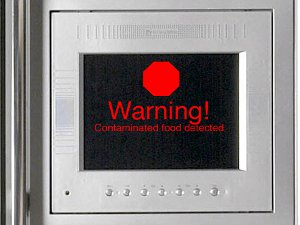 |
Pathogen Sensing RefrigeratorFood-borne illness are a significant concern in the U.S. Refrigerators could be equipped with sensors to detect bacterial contamination by the chemicals given off as gases by many of these bacteria. These types of sensors are already in use at the industrial level of food production. The approximate location of the contaminated food in the refrigerator would be determined by triangulation using multiple sensors placed at different locations in the refrigerator. The individual contaminated food would then be identified by passing each of the suspected items in turn directly in front of one of the sensors. by: Jules Wellinghoff | Aug 7, 2010
|
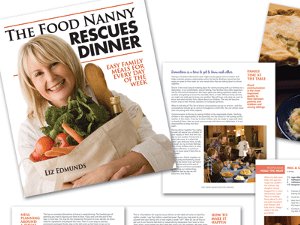 click for web site |
Family Dinners Help Create Healthy ChildrenIt is proven that children who eat with their family 5 nights a week have fewer risky behaviors: less teen smoking, drinking, illegal and prescription drug use. They also have better nutrition, fewer eating disorders, and better literacy. What about people who say they don't know how to cook, or are not good at it, or don't feel like cooking? Well, as far as Liz Edmunds, author of The Food Nanny Rescues Dinner, is concerned, she has counter-arguments for the 10 most common excuses, which she convincingly offers in her chapter "Yes, But..." Families can do more than government! by: Pati Palmer | Jul 25, 2010
|
 zedAlert - Sleep better. Sleep more. Sleep smarter.With numerous harmful effects on disease, obesity, safety, creativity, cognition, productivity, happiness, and more, sleep deprivation is one of the biggest, yet most under-appreciated health crises of modern times. zedAlert is an iPhone application currently under development by two Stanford students, together with faculty from the Stanford School of Medicine. It records user sleep data and uses mathematical models to determine the optimal times for each individual to sleep, in order to maximize restfulness. zedAlert also tracks sleep debt, provides push notification alerts, assists with diagnosis of sleep disorders, and offers many other tools for comprehensively improving sleep health. by: Stephanie Liou and Stewart Macgregor-Dennis | Aug 28, 2010
|
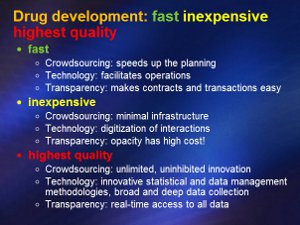 |
Revolutionize Drug Development, Really, Not on PaperThousands of new compounds (or old compounds for new indications) are not being tested because of boxed thinking within the current system, and prohibitive cost of clinical stages of development. The proposal is to utilize a completely transparent crowdsourcing model and convergence of modern computer sciences / healthcare IT with drug development know-how. As a result, higher quality data will be generated faster and cheaper, bringing many of new chemical entities and "repurposed" generics to patients. The adoption of this method will make the legacy drug development paradigm obsolete, and result in dramatic savings to the healthcare systems globally. by: Tomasz Sablinski | Aug 25, 2010
|
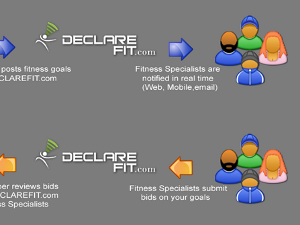 click for full image |
Fitness specialists compete for your health needsImagine a network that would connect those in need of fitness expertise with a local specialist. Individuals could post their fitness goals online, without the fear of a sales pitch, free from the anxiety of modern gyms. Fitness specialists within their area would be notified in real-time of said fitness goals. Fitness specialists would then place a bid (proposal and monetary requirements for their service). From the comfort of home, the consumer could select the fitness specialist that best meets their needs and share their contact information with ONLY the fitness specialist of choice. A “Bob and Jillian” for everyone! by: Joel Griffin | Jun 21, 2010
|
 |
Reducing flu spread by bowingA simple idea: flu and other illness (e.g. diarrhea) can be spread by shaking hands, cheek kissing, and hugging. We should promote bowing as the preferred way of greeting. This avoids spreading bacteria via hand-shaking, hugging, and kissing. If extreme intimacy or respect is needed people can touch their foreheads. by: Eric Durbrow | Jun 24, 2010
|
What if your doctor could prescribe you a healthcare app?You could download an application that delivered critical health information to your doctor when they needed it most. Practice Fusion, a free Electronic Medical Record system, has created a platform that allows developers to create applications that are directly connected to their medical chart. Real-time access to health information from remote patient monitoring systems will reduce medical costs, enhance chronic disease management and improve overall quality of care. A cardiologist could view real-time updates from a patient's Bluetooth-connected heart rate monitor in their online medical chart. A psychiatrist could monitor a patient’s mood as they adapt to new medication. by: Matt Douglass | Aug 31, 2010
|





